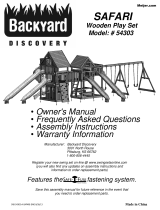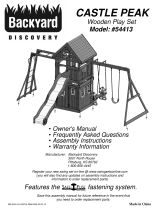
2
Twice a month during play season: Date: _________
Tighten all hardware.
Check all protective coverings on bolts, pipes, edges,
and corners. Replace if they are loose, cracked, or missing.
Rake and check depth of loose fill protective
surfacing materials to prevent compaction and to
maintain appropriate depth. Replace as necessary.
Once a month during play season: Date: _________
Lubricate all metallic moving parts per
manufacturer’s instructions.
Check all moving parts including swing seats, ropes,
cables, and chains for wear, rust, or other
deterioration. Replace as needed.
At the end of each play season or when the
temperature drops below 0º F: Date: _________
Remove plastic swing seats and other items as specified
by the manufacturer and take indoors or do not use.
Rake and check depth of loose fill protective
surfacing materials to prevent compaction and to
maintain appropriate depth. Replace as necessary.
At the beginning of play season: Date: ___________
Tighten all hardware.
Lubricate all metallic moving parts per
manufacturer’s instructions.
Check all protective coverings on bolts, pipes, edges,
and corners. Replace if they are loose, cracked, or missing.
Check all moving parts including swing seats, ropes,
cables, and chains for wear, rust, or other
deterioration. Replace as needed.
Check metal parts for rust. If found, sand and repaint
using a nonlead-based paint meeting the
requirements of 16 CRF 1303.
Check all wood members for deterioration and
splinters. Sand down splinters and replace
deteriorating wood members.
Reinstall any plastic parts, such as swing seats or
any other items that were removed for the cold season.
Rake and check depth of loose fill protective
surfacing materials to prevent compaction and to
maintain appropriate depth. Replace as necessary.
INSTALLATION:
1. Follow the instructions provided, do not
alter its design in any way.
2. Place the equipment on level ground,
not less than 6' (1.8m) from any structure
or obstruction such as a fence, garage,
house, overhanging branches, laundry
lines or electrical wires. If the area
where you will be installing your play-
set is not level, you must make it level.
3. Playsets must be anchored to the
ground. Follow the anchoring instruc-
tions provided with your building kit. If
soil conditions permit anchors to be
pulled out easily, such as in sandy soil
conditions, cementing is required.
4. Tighten all bolts securely to the intended
member then cut off all protruding
threaded ends of bolts with a hack saw
flush to the end of the nut and
remove sharp edges with a metal file.
WARNING: Children must not use the
playset until properly installed and proper
shock-absorbing surfacing material is in place.
OPERATION: Observing and
following statements and warnings
reduces the likelihood of serious or
fatal injury.
1. On-site adult supervision is recommended
for children of all ages.
2. Only one child, for each single planned
seat or single planned activity should
be allowed on this set at one time, with
a maximum weight of 105 pounds for
each child.
WARNING: You must teach children the
following:
A. Not to walk close to, in front of, behind,
or between moving items.
B. Not to twist swing chains or ropes or loop
them over the top support bar since this may
reduce the strength of the chain or rope.
C. Avoid swinging empty seats.
D. To Sit in the center of the swings with
their full weight on the seats.
E. Not to use the equipment in a manner
other than intended.
F.
Not to get off equipment while it is in motion.
G. Not to climb when equipment is wet.
H. Not to attach items to the playground
equipment that are not specifically
designed for use with the equipment
such as, but not limited to, jump
ropes, clothesline, pet leashes, cables
and chain as they may cause a
strangulation hazard.
I. Remove bike or other sports helmet
before playing on the playground
equipment.
3. Verify that suspended climbing ropes
are secured at both ends and that they
cannot be looped back on themselves.
4. Dress children appropriately and do not
allow them to wear inappropriate items,
such as but not limited to, loose fitting
clothing, hood and neck draw strings,
scarves, cord-connected items, capes,
and ponchos. These items can cause
death by strangulation. Provide well-
fitting and full enclosure footwear.
Examples of inappropriate footwear
are clogs, flip flops, and sandals.
5. Verify that all suspended swinging
components have at least 8" clear-
ance between the lowest point of
component and top of shock-absorbing
surfacing material.
WARNING: Lawn swings are designed
for use by children two years of age and
older. Use by children under the age of
two can result in entrapment between the
seat and backrest. NEVER place children
in a rearward facing position or with legs
between the seat and backrest because
the child’s body may pass through the
opening causing entrapment of the child’s
head.
DISPOSAL:
When the playset is to be retired from
service, disassemble and dispose of in
such a way that no unreasonable hazards
will exist. Follow your local disposal
requirements.
SAFETY
ANNUAL MAINTENANCE CHECKLIST
(Copy this section as needed and maintain for your records or visit www.playstarinc.com/maintenance)
Owner shall be responsible for maintaining the legibility of any warning labels.
If any of these conditions exist, call 1-888-752-9782 for ordering information.
Clean plastic components with warm water and a mild detergent such as dish soap.











